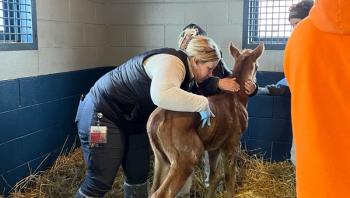
AVMA establishes policy actions, welfare goals
Schaumburg, Ill. - The American Veterinary Medical Association's Animal Welfare Committee (AWC) has been recharged as part of an approved directive from a task force reviewing the group's welfare policies and framework.
SCHAUMBURG, ILL. — The American Veterinary Medical Association's Animal Welfare Committee (AWC) has been recharged as part of an approved directive from a task force reviewing the group's welfare policies and framework.
At its spring meeting, the AVMA Executive Board voted down a plan to establish an animal welfare council. Instead, board members chose to expand the membership and charge of its existing welfare committee. As a result, $13,410 in budget increases were approved to add three new seats representing membership organizations. Another $5,000 was approved to support attendance at meetings. Some of the funds will pay for hiring consultants to AWC, Executive Board Chairman Dr. Bud Hertzog explains.
However, in an effort to cut costs, the board simultaneously dropped the American Association Industrial Veterinarian's seat on AWC. Hertzog wants to reverse that decision this month during the board's next meeting.
"We're always looking at reducing the sizes of committees for cost-saving factors," he says. "But the industrial veterinarians are some of the real leaders in our profession. I think we want the animal welfare committee as broad-based as we can get."
Policy issues
A revision to the AVMA's policy on Human-Labeled Drug Products, Sale to Veterinarians also struck a chord with Executive Board members who questioned the proposed sentence: "Veterinarians bear full responsibility when using human-labeled prescription products in the treatment of animals."
A debate ensued regarding whether veterinarians have control over the quality of drugs. The measure was tabled until this month's meeting.
Board members OK'd a policy on adverse event reporting, which encourages continued development and strengthening of adverse event reporting systems. The policy's language calls for "continued collaboration with constituent organizations, industry organizations, government entities and other stakeholders."
It comes from the Council on Biologic and Therapeutic Agents, which also submitted an Executive Board-approved revision to the AVMA's Guidelines for Veterinary Prescription Drugs policy. The change specifies drug containers must bear minimum directions for administration.
Per a Council on Communications' proposal, Executive Board members approved The Use and Management of E-mail and Similar Electronic Communications Identifiers policy. The goal is to protect the privacy of AVMA members' e-mail addresses. Officials hope the policy prompts more veterinarians to share their e-mail addresses.
Supporting AVMF
To keep the American Veterinary Medical Foundation functioning, AVMA officials agreed to grant the non-profit $46,000 in unrestricted funds for five years beginning in 2007 to help pay for administrative costs tied to fundraising initiatives.
Following a dry spell in donations, AVMA trimmed its staff to a minimum while performing housecleaning measures to bolster its presence. Now with its focus on disaster preparedness and relief, donations since Hurricane Katrina have poured in, officials say.
"We had a big influx of money come in, but we have some real reluctance to spend that on things not related to disasters," says Dr. Tracy Rhodes, Executive Board member and AVMF chairman. "We're trying to build up a good reserve so we can do some good things down the road."
Other action
AVMA Executive Board members weighed in on the following remaining agenda items:
- (Voted down) Partnering with the Merck Foundation and Merial to provide financial support for the Merck-Merial Veterinary Scholars Program and Symposium for 2007, with intent to fund the program in 2008 and 2009.
- (Accepted) AVMA support of the concepts of recommendations for strengthening the animal health framework of the U.S. contained in the National Research Council's 2005 report "Animal Health at the Crossroads: Preventing, Detecting and Diagnosing Animal Diseases".
- Amending the policy Leadership in Coordination of U.S. Animal Health Partnerships.
- National Animal Health Laboratory Network Funding policy.
- Declining a membership invitation to the Animal Agriculture Alliance.
- Agriculture Inspections at Points of Entry policy.
- Amending a policy on National Animal Identification Systems.
- Amending the policy Brucellosis Infection of Bison and Elk in the Greater Yellowstone Area.
- Reaffirming its endorsement of the California Veterinary Medical Association's Golden Rules of Pet Ownership.
- Amending the Guidelines for Animal-Assisted Therapy Programs.
- Amending the Policy on Pets in Senior, Disabled and Multifamily Public Housing.
- Revising the Policies and Procedures of the AVMA ABVS.
- Sponsorship of the Veterinarian Workshop Track at the American Humane Association 2006 annual conference in Schaumburg, Ill.
- Amending the Policy on Dog Bites.
- Rescinding recognition of the toxicology pathology subspecialty under the recognized veterinary specialty of anatomic pathology with the American College of Veterinary Pathology.
- "Healthy Animals 2010" vision statement, adopting the statement as part of the AVMA strategic planning process.
- Supporting the Merck-Merial Veterinary Scholars Symposium in the amount of $10,000.
- Amending the position statement Identification and Microchip Standards of Animals and re-titling it the Policy on Livestock Identification.
- Rescinding the position statement Microchip Standards.
- Amending the position statement Guidelines for Horse Show Veterinarians.
- Amending the position statement Milk Quality — Quality Assurance.
- Amending the AVMA Standard Consent Form.
- Amending the Model Euthanasia Authorization.
- Amending the Position on Veterinary Inspection Certificates.
- Rescinding the policy Microbiological Endpoints for Antimicrobials.
- Partnering with the Aquaculture Underwriting and Management Services Ltd. to solicit support to maintain, improve and expand Online Aquatic Veterinary Resources.
- Strategically Coordinated Communication policy.
Newsletter
From exam room tips to practice management insights, get trusted veterinary news delivered straight to your inbox—subscribe to dvm360.




